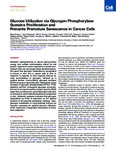Glucose utilization via glycogen phosphorylase sustains proliferation and prevents premature senescence in cancer cells.
| dc.contributor.author | Favaro, E | en |
| dc.contributor.author | Bensaad, K | en |
| dc.contributor.author | Chong, MG | en |
| dc.contributor.author | Tennant, DA | en |
| dc.contributor.author | Ferguson, DJP | en |
| dc.contributor.author | Snell, C | en |
| dc.contributor.author | Steers, G | en |
| dc.contributor.author | Turley, H | en |
| dc.contributor.author | Li, J-L | en |
| dc.contributor.author | Günther, UL | en |
| dc.contributor.author | Buffa, FM | en |
| dc.contributor.author | McIntyre, A | en |
| dc.contributor.author | Harris, AL | en |
| dc.date.accessioned | 2017-11-27T15:33:41Z | |
| dc.date.available | 2017-11-27T15:33:41Z | |
| dc.date.issued | 2012-12-05 | en |
| dc.identifier.uri | http://hdl.handle.net/10026.1/10292 | |
| dc.description.abstract |
Metabolic reprogramming of cancer cells provides energy and multiple intermediates critical for cell growth. Hypoxia in tumors represents a hostile environment that can encourage these transformations. We report that glycogen metabolism is upregulated in tumors in vivo and in cancer cells in vitro in response to hypoxia. In vitro, hypoxia induced an early accumulation of glycogen, followed by a gradual decline. Concordantly, glycogen synthase (GYS1) showed a rapid induction, followed by a later increase of glycogen phosphorylase (PYGL). PYGL depletion and the consequent glycogen accumulation led to increased reactive oxygen species (ROS) levels that contributed to a p53-dependent induction of senescence and markedly impaired tumorigenesis in vivo. Metabolic analyses indicated that glycogen degradation by PYGL is important for the optimal function of the pentose phosphate pathway. Thus, glycogen metabolism is a key pathway induced by hypoxia, necessary for optimal glucose utilization, which represents a targetable mechanism of metabolic adaptation. | en |
| dc.format.extent | 751 - 764 | en |
| dc.language | eng | en |
| dc.language.iso | eng | en |
| dc.subject | Angiogenesis Inhibitors | en |
| dc.subject | Animals | en |
| dc.subject | Antibodies, Monoclonal, Humanized | en |
| dc.subject | Bevacizumab | en |
| dc.subject | Breast Neoplasms | en |
| dc.subject | Cell Hypoxia | en |
| dc.subject | Cell Line, Tumor | en |
| dc.subject | Cell Proliferation | en |
| dc.subject | Cellular Senescence | en |
| dc.subject | Female | en |
| dc.subject | Glucose | en |
| dc.subject | Glycogen | en |
| dc.subject | Glycogen Phosphorylase | en |
| dc.subject | Glycogen Synthase | en |
| dc.subject | HCT116 Cells | en |
| dc.subject | Humans | en |
| dc.subject | MCF-7 Cells | en |
| dc.subject | Mice | en |
| dc.subject | Mice, Nude | en |
| dc.subject | RNA Interference | en |
| dc.subject | RNA, Small Interfering | en |
| dc.subject | Reactive Oxygen Species | en |
| dc.subject | Transplantation, Heterologous | en |
| dc.subject | Tumor Suppressor Protein p53 | en |
| dc.title | Glucose utilization via glycogen phosphorylase sustains proliferation and prevents premature senescence in cancer cells. | en |
| dc.type | Journal Article | |
| plymouth.author-url | https://www.ncbi.nlm.nih.gov/pubmed/23177934 | en |
| plymouth.issue | 6 | en |
| plymouth.volume | 16 | en |
| plymouth.publication-status | Published | en |
| plymouth.journal | Cell Metab | en |
| dc.identifier.doi | 10.1016/j.cmet.2012.10.017 | en |
| plymouth.organisational-group | /Plymouth | |
| plymouth.organisational-group | /Plymouth/REF 2021 Researchers by UoA | |
| plymouth.organisational-group | /Plymouth/REF 2021 Researchers by UoA/UoA01 Clinical Medicine | |
| plymouth.organisational-group | /Plymouth/REF 2021 Researchers by UoA/UoA01 Clinical Medicine/UoA01 Clinical Medicine | |
| dc.publisher.place | United States | en |
| dcterms.dateAccepted | 2012-10-24 | en |
| dc.identifier.eissn | 1932-7420 | en |
| dc.rights.embargoperiod | Not known | en |
| rioxxterms.versionofrecord | 10.1016/j.cmet.2012.10.017 | en |
| rioxxterms.licenseref.uri | http://www.rioxx.net/licenses/all-rights-reserved | en |
| rioxxterms.licenseref.startdate | 2012-12-05 | en |
| rioxxterms.type | Journal Article/Review | en |


